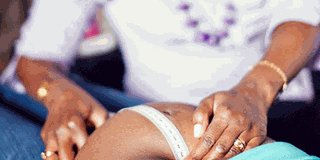Celebrating midwives

A midwife attends to a patient. There is a shortage of trained midwives in Kenya with one midwife against 25,000 women. PHOTO | POOL | NATION MEDIA GROUP
What you need to know:
- World silently marks the International Day of Midwife because of Covid-19
- In Kenya, 20 per cent of deliveries and pregnancies have complications.
- Ratio of midwives to mothers is one to 25,000
- About 90 per cent of pregnant women go for antenatal care late
Today, the world marks the International Day of Midwife. However, the Covid-19 pandemic across the globe has silenced this year’s commemoration. Ordinarily, major activities would be taking place across the world to sensitize the masses on the roles midwives play in the society.
Here in Kenya, the situation is no different as people continue to observe movement restrictions to tame spread of the pandemic.
In a phone interview, the chairperson of the Midwives Association of Kenya (MAK) Ms Louisa Muteti said midwives play a critical role in ensuring low maternal mortality.
She said 80 per cent of deliveries and pregnancies in the country are usually normal, with only about 20 per cent having complications.
To help the 20 per cent, Ms Muteti said the mothers are advised to start early antenatal care and pre-conception.
Deformities
“Unfortunately, about 90 per cent of pregnant women go for antenatal care when they are already six, seven or eight months pregnant, which is very late,” she said.
Ms Mutetei said the lack of, or late antenatal care is responsible for deformities among new-borns, since mothers don’t know the importance of, for example, a good diet and implications of issues like high blood pressure.
She emphasised the importance of pre-conception care where couples are taken through, among other things, the importance of the man having a good diet.
“The quality of spermatozoa can determine the outcome of the pregnancy and the quality of babies. Some miscarriages occur because women are never prepared for pregnancies,” she said.
Ms Muteti, who has worked as a midwife for 37 years, decried the acute shortage of mid-wives in the country. The ratio of midwives to women is one to 25,000.
She noted that many people confuse doctors and nurses for midwives, which is not the case - midwives specialise in sexual reproductive, maternal and new-born care.
The organization is thus lobbying for a review of the training curriculum for midwifery.
MAK was launched four years ago with support from United Nations Population Fund (UNFPA). It has 250 members, and is pushing for counties to hire midwives in their hospitals to reduce maternal mortality.
Mortality rates
UNFPA, which is the UN body dealing with sexual and reproductive health agency has been in the forefront in assisting the country deal with high mortality rate.
UNFPA Country director Dr Ademola Olajide told Daily Nation the organization has supported national and county governments by ensuring appropriate policies on reproductive health are put in place.
He added that the organisation offers training and re-training of midwives to ensure they offer excellent services.
“We also provide equipment and other consumables for use to health facilities as well as advocacy and technical assistance,” he said.
And as the Covid-19 continues to bite, Dr Oladije said UNFPA is supporting the national and county governments with Personal Protective Equipment (PPEs) for the frontline health workers.
According to the organisation, the maternal mortality ratio (number of women dying of pregnancy-related causes) in the country stands at 488 deaths per 100,000 live births.
This ranks Kenya among the 10 most dangerous countries for a woman to give birth in.
Limited use of skilled care, inadequate skills among healthcare providers and low health facility coverage are blamed for this high number.
Global shortage
Globally, International Confederation of Midwives (ICM) has, since 1992, led global recognition and celebration of the work of midwives every May 5.
Each year, ICM has a theme to motivate its member associations, partners and stakeholders.
This year’s theme is ‘Midwives with women: Celebrate, demonstrate, mobilise, unite – our time is NOW!’
There are currently 143 midwives' associations, representing 124 countries across each continent.
According to ICM, there is a global shortage of 3.5 million health workers, including 350,000 midwives, without whom millions of women and new-borns are at risk.
The organisation, in its website, notes midwives can help prevent two-thirds of maternal deaths and half of new-born deaths, provided they are well-educated, well-equipped, well-supported and regulated.
“Midwives not only deliver babies but also provide comprehensive sexual reproductive health services, post-abortion care, the prevention of mother-to-child transmission of HIV, as well as family planning and counselling services,” ICM says.





